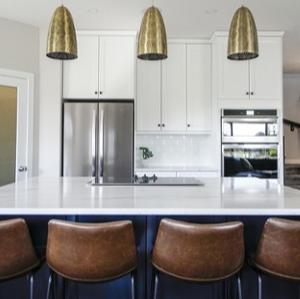The Difference Between Prefabricated vs. Slab Natural Stone Countertops

Still, you might be understandably confused when you start looking at options for countertops. You’ll likely come across both prefabricated and slab countertops. What’s the difference? Is one better than the other? How can you choose the natural stone option that are right for your home, needs, and budget?
While both prefab and slab options both use natural stone, there are significant differences between the two. Here are a few things you should be aware of before you choose one versus the other.
The Skinny on Prefab
The main misconception about prefabricated countertops is that they are imitation stone, but this is not the case. They are just as real as any other natural marble or granite countertop, but prefab options differ from slab stone in a few key ways.
First, there’s the thickness of the piece of stone you’ll receive. One of the reasons prefabricated countertops are less expensive than slab is that they are thinner. Slabs of natural stone are typically a minimum of 1.25 inches thick, where prefab stone can be as little as 0.5-0.75 inches thick.
Because of this disparity, paired with the fact that prefab stone is oftentimes mass manufactured and quality control becomes a concern, prefab countertops could be more prone to issues like cracking. This is why this type of countertop is often backed by a wood base to reinforce the stone and prevent serious concerns like cracking and chipping.
Prefabricated countertops are also precut to just a few standard sizes. This won’t be a problem for homes that feature surfaces within these measurements, but if you have a larger or custom shaped countertop area, you could end up with an undesirable number of seams where the stone pieces come together.
In addition, prefab options are often limited to popular varieties of stone, certain colors, and typically, only a couple types of edging. Because the edge piece is added on to the underside along the perimeter of the countertop, you’ll also have a seam running along the outside edge.
What’s in a Slab?
A slab of natural stone is typically larger and thicker than prefab countertops, giving homeowners more options to choose from. Slabs of granite are mined all over the world, coming from natural veins of stone that produce a wide range of marble, granite and quartzite varieties.
Slab countertops lack the many restrictive qualities inherent to prefabricated options. You have the option to choose from dozens of stone varieties to find the perfect color, veining, and character to suit your personal tastes.
In addition, you can also choose from many different styles of edging. In other words, you have endless options for customization when you choose slab over prefab countertops.
Cost and Convenience
When installing natural stone countertop surfaces in your kitchen, bathrooms, or other areas of the home, there are several factors to consider. One thing you can’t ignore is cost, and there’s no getting around the fact that prefab options are less expensive.
With fewer customizable features, thinner cuts and preset dimensions, not to mention mass manufacturing and shipping from just a couple of locations, manufacturers are able to significantly reduce costs. You won’t necessarily get the same quality or options as you would with slabs of marble, granite, or quartzite, but you will still get a natural stone.
Read ‘Kitchen Countertop Budget: We Breakdown the Cost of Natural Stone Countertops’
There’s also a level of convenience involved. When you choose prefab countertops, you won’t have to take the time to review and choose a specific slab, potentially reducing your project time. You’ll simply get the precut size that works best for your countertop space in whichever variety of stone you choose. Keep in mind, however, that large or irregular surfaces may require more than one cut of stone, and this could significantly increase the cost.
Custom Considerations
If you want more options, selecting a natural stone slab may be the best choice for you. You’ll get to pick the specific piece of stone you want, have it cut, finished, and installed to suit your specifications, making it ideal for homeowners that want a custom counter surface. While the price may increase with this option, you get what you pay for with custom considerations – lasting appeal and added home value.
Need Help on Your Next Project?
We are happy to help you with your next project! We specialize in creating custom countertops for kitchens and bathrooms in Fairfield County, CT and Westchester County, NY. Please visit us today or contact us here to learn more about our large selection of stone countertop surfaces.


